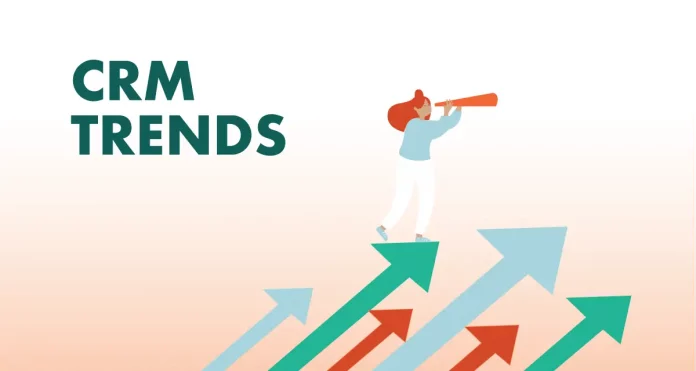CRM technology is on the rise, be sure to keep up
Every business needs a process to interact with customers. That’s why CRMs have been on the rise.
Initially, People used CRMs to collect and store contact details of customers and clients. But now, people use CRMs for multiple reasons, such as sales experience, customer intelligence, lead generation, and tracking user engagement.
The battle for the best CRM is fierce. New competitors keep emerging with new and groundbreaking features. The established CRMs must update their features to stay in the race.
Because of the competition, CRMs offer a broad list of features that users can automate.
The CRMs of today offer integrations with other applications and software. CRMs take data from every available source to enhance customer engagement. A few are IoT devices, social media, and performance metrics.
CRMs have changed a lot over the decade. Before, they used to be targeted at companies in sales. But now we can see a shift. We are even getting CRMs focussed on B2C products such as DevRev.
Let’s look at the emerging trends in CRMs to get an idea of their future.
AI — Artificial Intelligence
There is so much hype around the world about artificial intelligence. No wonder it has made its way into CRMs.
Artificial intelligence can help a broad spectrum of aspects, such as forecasts, sales efficiency, and customer interaction.
AI-enabled chatbots can directly connect with the CRM and help you solve customer queries.
The chatbots collect relevant information, such as customer names and services used by the customer. Then a human operator can oversee the issue and deliver a solution. AI can learn from these operations and improve the next time.
AI can also help you improve your sales strategy by grading customer interactions based on mood, purchasing ability, or interest and providing a score. Based on the suggestions provided by the AI, you can close a deal with customers more often.
AI can also generate more accurate sales forecasts. It can help you analyze your future sales and how your business would perform in other parts of the world.
IoT — Internet of Things
Everything is getting more and more connected. We use Alexa devices to control our lights and TVs.
Every device your organization produces or uses can generate data( provided it has the capability.)This data can be used in testing and operations. And it has made its way into CRMs.
You can use data generated about the customers to help them with issues that might arise in the future. You can also better segment your customers to improve marketing and sales pitches.
CRM to XRM
CRMs were originally created for a singular purpose — handling your customer relations.
But businesses need to manage more than just customer information. Different businesses have different needs. That’s why we now have XRMs instead of CRMs. Here the X can stand for anything. An XRM is a software that handles all of a business’s relationships.
An XRM will help you keep track of your suppliers, vendors, contractors, and other parties. You can get the same level of experience when talking with a customer.
Take a look at DevRev, for example. It’s a CRM of a DevCRM targeted at users and developers. It was created so that developers can get critical feedback and fix problems fast.
CRM integration
CRMs are getting more integrated, and for them to function better, they need to be able to access more data about the organization. Just customer information and sales data are not enough. Real-time metrics have become very important to serve customers.
CRMs these days are built to take on large data and gain key insights using it. CRMs are also more well connected throughout organizations. Having many departments use the same CRM enables you to connect lingering dots very efficiently.
Sales and Marketing teams can better coordinate, thus improving prospective sales.
Social CRM
Your traditional CRMs only kept track of your direct engagement with customers. But many conversations are happening outside your engagement, like Reviews, Opinions, and Sharing insights over the internet. A new extension to CRMs was created called Social CRM to bridge this gap.
Social CRMs allow you to track customer interactions and engagement on social media platforms. It tracks metrics on the interactions on these sites like — engagement duration, brand mentions, Follower authority, Traffic, etc.
With a Social CRM, you can target your business’s social media presence and drive it to enhance your company’s image. You can generate new leads and also find potential customers with these engagements.
Automation
Automation is not a new aspect of CRMs, but as time goes on, more and more tasks get automated. Several new automated workflows are now possible with CRMs, and the responsibility of a CRM keeps growing.
You have automated chatbots, automated email correspondence, and automatic work segregation among departments. The automation every year gets ever so seamless, making it more trustable and usable.
With so many new features, your customers can get high-quality service, all while the operating costs come significantly down.
Modular CRMs
CRM was traditionally always considered a significant step that a business would need as it grew. Companies would have to prepare for such a change in operations.
But no longer. Today, CRMs are packaged ever tightly with features making everything a XaaS. This ensures that there are very small modular CRMs that even single-worker businesses can use them.
With cloud integration, it is not required that a company even have an IT infrastructure. You can get many CRM features like collecting data, automated marketing, and timely scheduling for cheap and with almost 0 additional operation costs.
Final words
CRMs have always been changing and this time around are under a process of constant re-imagination. CRMs have become very accessible, and you can buy only what you need. The CRMs of today are transforming in this direction —
- Modular CRMs where everything is sold separately (XaaS)
- AI is getting more powerful and handy
- CRMs are getting more integrated, using all sorts of data
- CRMs have become more autonomous and trustable
- CRMs target new niches like social media






